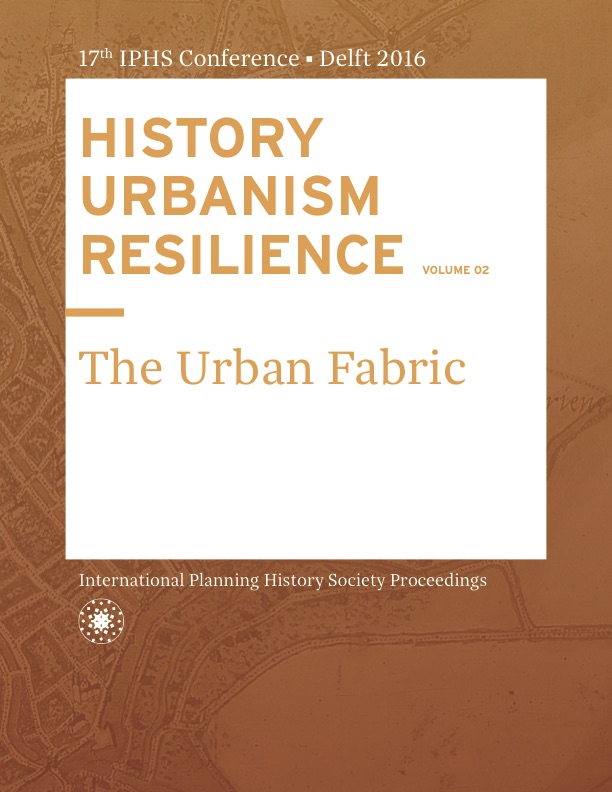'Be bold, courageous and wise'; Post-war reconstruction in the city of Exeter
DOI:
https://doi.org/10.7480/iphs.2016.2.1246Abstract
The city of Exeter sustained extensive bomb damage during the Second World War, suffering a total of 18 air raids between 1940 and 1942. Exeter was designated as a blitzed city and encouraged to produce a comprehensive reconstruction plan. The resultant plan, Exeter Phoenix, was initially praised and welcomed by traders and citizens. However, it was not fully executed and later became the subject of derision. The Exeter Phoenix has been the subject of a small number of studies which have cited trader pressure and financial constraints as the reasons for the alterations, while the rebuilt central area has been criticised for its architecture, design and poor architectural control. However, it is notable that these studies have not examined the local records in any detail. As a result various factors which led to changes in Sharp’s plan have been overlooked, as have the methods which the City Council used to control the architectural treatment of the new buildings. This paper examines the city’s use of leases as method of architectural control and the handling of trader discontent in order to execute the plan. External factors such as governmental guidelines are also indicated as factors for changes in the plan.References
Anonymous, ‘Traders Call for Temporary Shops’, Express and Echo, July 16 1942
Anonymous, ‘Fifty Temporary Shops, Express & Echo, July 18 1942
Anonymous, Letters to the editor; ‘New citizen’, Express & Echo, April 10 1946
Anonymous, Mayor’s Warning: Cheap means a bad new city’, Express & Echo, April 26 1946
Anonymous, ‘Vague instructions on rebuilding city: Action without waiting?’ Express & Echo, June 20 1946
Anonymous, ‘Walled City of the West: A bold plan for Exeter’, New Chronicle, March 7 1946
Anonymous, ‘Great Shopping Centre’, Western Morning News, July 16 1942
Anonymous, ‘Praised by Experts: Exeter plan’, Western Morning News, January 3 1946
Anonymous, Rejoinder of Exeter Replanning Critics’, Western Morning News, June 25 1947;
Brierley, John, Exeter 1939-1974: The reconstruction of a city. MA Diss, University of Manchester, 1980
Exeter City Council, City Architect’s Papers, Box 22, Devon Heritage Centre, Exeter
Exeter City Council, City Architect’s Papers, Box 23, Devon Heritage Centre, Exeter
Exeter City Council, City Architect’s Papers, Box 24, Devon Heritage Centre, Exeter
Exeter City Council, City Architect’s Papers, Box 25, Devon Heritage Centre, Exeter
Exeter City Council, City Planning Officer’s Papers, Box 2, Devon Heritage Centre, Exeter
Exeter City Council, City Minutes 1946, Devon Heritage Centre, Exeter
Exeter City Council, Replanning Committee Minutes January 1943-December 1945, Devon Heritage Centre, Exeter
Flinn, Catherine, Overlooked Constraints; the reconstruction of blitzed city centres in Britain 1945-1955, MA Diss, Oxford Brooks University, 2007
Flinn, Catherine, ‘Exeter Phoenix: Politics and the reconstruction of a city’, Southern History 30 (2008), 104-127
Bryan Little, Portrait of Exeter. London: Robert Hale, 1983
Hasegawa, Junichi, ‘The reconstruction of Portsmouth in the 1940’s’, Contemporary British History 14/1 (2000), 45-62
Pevesner, Nikolas, and Bridget Cherry, The Buildings of England: Devon., London: Penguin, 1989 (2nd Edition)
Sharp, Thomas, Exeter Phoenix. London: Architectural Press, 1946
Tait, Malcom, and Aiden White, ‘Exeter and the question of Thomas Sharp’s physical legacy’, Planning Perspectives 24/1 (2009), 77-97
Tiratsoo, Nick, ‘Labour and the reconstruction of Hull 1945-1951’ in The Attlee Years, ed. Nick Tiratsoo, London: Pinter Publications, 1991
Venning, Norman, Exeter: The blitz and rebirth of a city; a pictorial history. Exeter: Devon Books, 1988
Worrell, Geoff, Target Exeter. Exeter: Express & Echo, 1979

